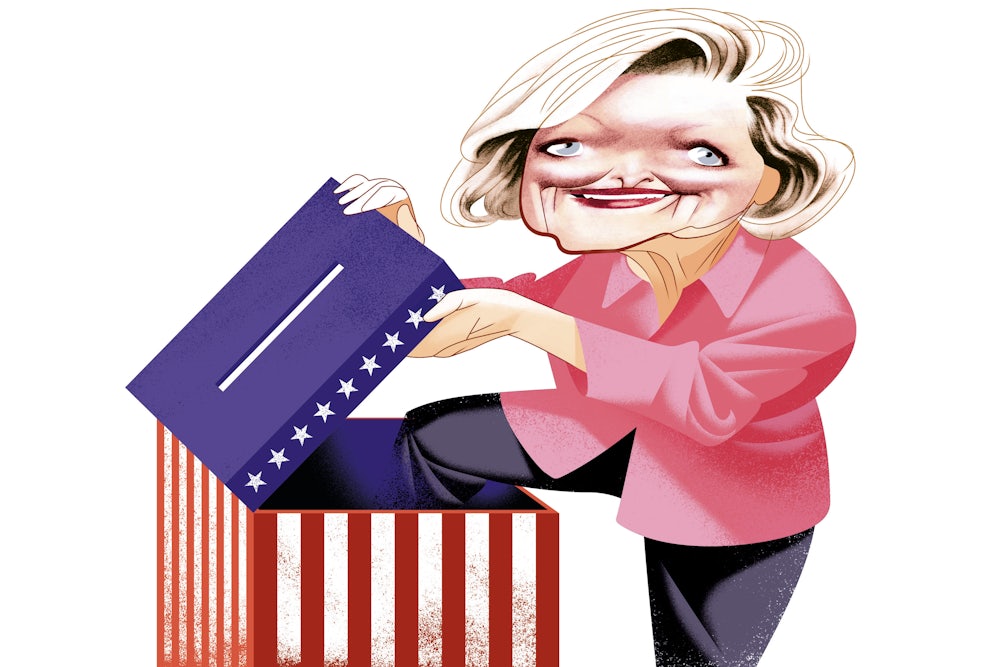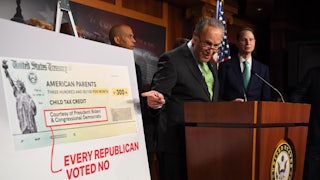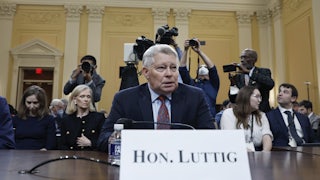A spacious ballroom at the Arizona Grand Resort in Phoenix was packed the weekend of March 11 with scores of Donald Trump loyalists still fuming about widely debunked claims that Joe Biden won the 2020 election thanks to rampant fraud. Dubbed an “election integrity summit,” the gathering was the handiwork of Trump’s former legal adviser, the veteran conservative activist Cleta Mitchell. And while Mitchell has garnered national attention for riling up Trumpists with false claims of election fraud in Georgia after the state was called for Biden, she’s now quietly channeling that anger into mobilizing activists to aggressively combat the specter of voting fraud in the next battle: the 2022 midterm elections.
Mitchell organized the Arizona summit on behalf of the Conservative Partnership Institute, a nonprofit that raked in $1 million from Trump’s leadership PAC last year. Founded in 2017 by former South Carolina Senator Jim DeMint, CPI has become a hub for the Big Lie in exile, with former Trump chief of staff Mark Meadows signing up as senior partner shortly after leaving the White House last year, and Mitchell joining in March 2021 as senior legal fellow. CPI boasted revenue of $5.3 million in fiscal 2019, has arranged D.C. internships for young conservatives, and has worked with other right-wing groups to push conservative goals.
But central to the institute’s current mission is Mitchell, who leads its self-styled “election integrity network.” She has engineered a roaming series of summits this year in states Republicans hope to swing back in 2024: Georgia, Pennsylvania, Virginia, Michigan, and Nevada—along with the perennial battleground Florida, which Trump won. Mitchell has sold the network as a way to create state and local election “infrastructure,” which includes advocating unorthodox surveillance tactics of election officials and operations to ferret out any hints of fraud—real, or more often hypothetical.
One notable speaker at the summit, whom Mitchell interviewed on a stage, was Karen Fann, the Arizona state Senate president and 2022 national chairwoman of the conservative American Legislative Exchange Council, a group that promotes model laws for states to adopt, and that Mitchell has previously advised. Arizona has already passed one anti-voting law this year, imposing onerous restrictions to prove citizenship before registering to vote, and the state legislature is currently considering a raft of other measures that would empower state officials to conduct further reviews of elections.
One attendee of the Phoenix summit, who asked for anonymity, told me that “the event definitely used the false allegations of fraud in 2020 as a call to action to rally support for vigilant engagement this year in the election process,” to spur more robust monitoring of polling sites. The attendee added: “There was a large focus on recruiting precinct officials to watch the polls and all of the other processes associated with elections.”
To voting rights advocates, the campaign looks like a recipe for voter suppression and intimidation, especially of minorities, and could incite harassment against election officials. At these summits, the 71-year-old Mitchell, members of conservative groups such as Tea Party Patriots, GOP elected officials, and Republican National Committee staffers have delivered a blunt message: Conservatives ought to expand poll watching and “clean up” voter rolls—often by working as precinct and poll officials—in order to curb any voting fraud and bolster their electoral chances in 2022.
Mitchell hails from Oklahoma, where she began her career as a Democratic member of the state legislature before moving to D.C. and switching parties in the 1990s. Since then, she has amassed an extensive résumé of conservative clients: Mitchell has done legal stints advising the National Rifle Association (where she was once a board member), numerous GOP campaigns, and several dark-money nonprofit groups.
Some veteran conservatives who know Mitchell’s work say that her advice often pushed the legal envelope. “You tell Cleta where you want to end up, and she will come up with a way to get you there, whether it’s legal or not,” one former senior NRA official told me, quipping that she’s the “fringe of the fringe.” And a GOP election lawyer who has known Mitchell for years, and requested anonymity, added: “Cleta was sort of a classic lawyer for Donald Trump because she told Trump what he wanted to hear, as opposed to what he ought to hear from his lawyer.”
Mitchell started as a volunteer legal adviser to bolster Trump’s fraud claims in Georgia. She was recruited by Meadows the day after the 2020 election and eventually emerged as part of the core group of Trump lackeys attempting to subvert the results. She participated in Trump’s phone call with Georgia Secretary of State Brad Raffensperger, wherein the president attempted to coerce the state official to “find” the extra 11,780 votes he needed to win the state. Fulton County District Attorney Fani Willis is currently conducting a wide-ranging probe into that call, examining whether Trump and the other participants broke state laws. A special grand jury was impaneled in early May.
Mitchell has also been subpoenaed by the House panel probing the January 6 insurrection, as she was in contact with Trump that day. In response, Mitchell filed a lawsuit to block the subpoena. When reports of her role on Trump’s call with Raffensperger quickly surfaced in 2021, Mitchell resigned from her two-decade career with the law firm Foley & Lardner—as it was conducting an internal review—and joined CPI two months later. (Mitchell did not respond to a request for comment for this story.)
“Cleta Mitchell allied herself with Trump’s election conspiracy theories on the infamous Trump-Raffensperger call,” Dennis Aftergut, a former federal prosecutor, said, adding acidly: “If that makes one an advocate for election integrity, Charles Ponzi was a champion of investment integrity.”
In loose alliance with other conservative groups such as Heritage Action, Tea Party Patriots, and FreedomWorks—where she was tapped in March 2021 to lead a “National Election Protection Initiative” with a multimillion-dollar budget—Mitchell and CPI have worked with gusto to tighten voting laws: That campaign helped spur at least 19 states in 2021 to pass more stringent voting measures, including voter identification mandates and curbs on absentee ballots, according to the Brennan Center for Justice.
Mitchell’s cachet among the right’s big donors is considerable: She sits on the board of the Lynde and Harry Bradley Foundation, which has doled out hundreds of thousands of dollars in recent years to conservative election integrity and legal groups, including the Public Interest Legal Foundation, where Mitchell chairs the board. To help Trump overturn his loss in Arizona, Mitchell raised about $1 million in funds for a partisan audit of the state’s largest county—which wound up backfiring when the audit confirmed Trump’s loss there.
The programming at the CPI summits this year has partly overlapped, and included participants from an RNC election integrity drive that has recruited directors in 18 states and thousands of poll watchers, as The New York Times revealed in late May. To tutor activists at the summits about how to create local and state task forces, Mitchell and CPI have distributed a 19-page manual dubbed “The Citizens Guide to Building an Election Integrity Infrastructure.” The manual suggests some traditional poll monitor methods, but takes an ominous tone, urging activists to follow “every step” of vote-by-mail operations and advising them to “be ever-present” inside election offices.
AMAC Action, a conservative grassroots arm of the Association of Mature American Citizens that boasts over two million members, has co-sponsored several CPI summits. “We don’t want to see the kinds of shenanigans in 2020” again, Bob Carlstrom, AMAC Action’s president, told me. Carlstrom, a veteran D.C. lobbyist who expected to attend his first summit in North Carolina in June, added that AMAC Action has encouraged its volunteers to be poll workers, election officials, and poll watchers. His group also has “been quite active in working on legislation” in Arizona, Texas, Pennsylvania, and other states where CPI and allied groups have spent millions promoting new laws that have curbed voting rights.
Such multifaceted conservative efforts by Mitchell and CPI have prompted concern from election watchdogs worried about the false narrative of major fraud leading to voter suppression and intimidation targeting Black and other minority voters. “These lies are then used to justify restrictive policies that make it harder for people to vote, particularly in communities of color,” said Sean Morales-Doyle, the acting director of the voting rights and elections program at the Brennan Center for Justice. He added, “It is also important to remind voters that there are laws prohibiting the intimidation of voters and election officials. We cannot let the threat of intimidation alone prevent anyone from participating in our democracy.”
According to Mitchell’s blog and radio interviews she’s done this year—including an April one with Trump uber loyalist Steve Bannon—the CPI summits are building a state-based “movement.” Mitchell now hosts a podcast, dubbed Who’s Counting, where she speaks with like-minded conservative activists in states such as Arizona, Michigan, and Pennsylvania. The podcasts tend to hype allegations of improper voting and election practices. Mitchell bluntly told Jane Mayer of The New Yorker last year that the goal of her post-2020 work has been “to make it harder to cheat,” without a nod to former Attorney General William Barr’s acknowledgment in late 2020 that there was no significant fraud in Biden’s win by over seven million votes nationally.
Since the first meeting in 2021, the summits have drawn several conservative and political bigwigs, including Tea Party Patriots leader Jenny Beth Martin and CPI chair DeMint. Meadows was a keynote speaker at a CPI summit in Georgia, but his public role has diminished following the disclosure in March that North Carolina was investigating whether he committed voter fraud. The inquiry was prompted by a New Yorker report that in 2020 Meadows registered to vote using an address where he’d never lived—a potential rare instance of actual voter fraud. Shortly before the probe became public, Meadows quietly dropped out of CPI’s Phoenix summit, where he was supposed to be a keynote speaker, and he does not appear to have been at any other public CPI events.
The “election integrity” agenda advanced by CPI and Mitchell has set off alarm bells for Democratic Senator Sheldon Whitehouse. “From Cleta Mitchell’s dark-money group to Heritage Action, we see dark money crawling everywhere behind voter suppression and election subversion,” Whitehouse told me.
Looking ahead, the Brennan Center’s Morales-Doyle is worried that the summits could “increase the risk that vigilante actors will engage in intimidation and harassment of voters and election workers. In short, the people promoting these lies about so-called election integrity are doing serious harm to our democracy.”






